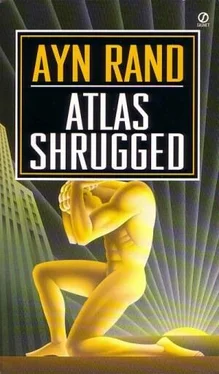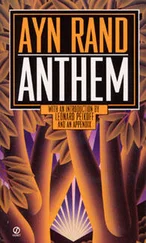She wondered how his eyes had been able to find her in that crowd.
She had seen the brief pause of his glance, which no one else could notice; the glance had been more than a kiss, it had been a handshake of approval and support.
He did not glance again in her direction. She could not force herself to look away. It was startling to see him in evening clothes and more startling still that he wore them so naturally; he made them look like a work uniform of honor; his figure suggested the kind of banquet, in the days of a distant past, where he would have been receiving an industrial award. Celebrations—she remembered her own words, with a stab of longing—should be only for those who have something to celebrate.
She turned away. She struggled not to look at him too often, not to attract the attention of her companions. She had been placed at a table prominent enough to display her to the assembly, but obscure enough to keep her out of the line of Galt's sight, along with those who had incurred Galt's disfavor: with Dr. Ferris and Eugene Lawson.
Her brother Jim, she noted, had been placed closer to the platform; she could see his sullen face among the nervous figures of Tinky Holloway, Fred Kinnan, Dr. Simon Pritchett. The tortured faces strung out above the speakers' table were not succeeding in their efforts to hide that they looked like men enduring an ordeal; the calm of Galt's face seemed radiant among them; she wondered who was prisoner here and who was master. Her glance moved slowly down the line-up of his table: Mr. Thompson, Wesley Mouch, Chick Morrison, some generals, some members of the Legislature and, preposterously, Mr. Mowen chosen as a bribe to Galt, as a symbol of big business. She glanced about the room, looking for the face of Dr. Stadler; he was not present.
The voices filling the room were like a fever chart, she thought; they kept darting too high and collapsing into patches of silence; the occasional spurts of someone's laughter broke off, incompleted, and attracted the shuddering turn of the heads at the neighboring tables. The faces were drawn and twisted by the most obvious and least dignified form of tension: by forced smiles. These people—she thought—knew, not by means of their reason, but by means of their panic, that this banquet was the ultimate climax and the naked essence of their world. They knew that neither their God nor their guns could make this celebration mean what they were struggling to pretend it meant.
She could not swallow the food that was placed before her; her throat seemed closed by a rigid convulsion. She noticed that the others at her table were also merely pretending to eat. Dr. Ferris was the only one whose appetite seemed unaffected.
When she saw a slush of ice cream in a crystal bowl before her, she noticed the sudden silence of the room and heard the screeching of the television machinery being dragged forward for action. Now—she thought, with a sinking sense of expectation, and knew that the same question mark was on every mind in the room. They were all staring at Galt. His face did not move or change.
No one had to call for silence, when Mr. Thompson waved to an announcer: the room did not seem to breathe.
"Fellow citizens," the announcer cried into a microphone, "of this country and of any other that's able to listen—from the grand ballroom of the Wayne-Falkland Hotel in New York City, we are bringing you the inauguration of the John Galt Plan!"
A rectangle of tensely bluish light appeared on the wall behind the speakers' table—a television screen to project for the guests the images which the country was now to see.
"The John Galt Plan for Peace, Prosperity and Profit!" cried the announcer, while a shivering picture of the ballroom sprang into view on the screen. "The dawn of a new age! The product of a harmonious collaboration between the humanitarian spirit of our leaders and the scientific genius of John Galt! If your faith in the future has been undermined by vicious rumors, you may now see for yourself our happily united family of leadership! . . . Ladies and gentlemen"—as the television camera swooped down to the speakers' table, and the stupefied face of Mr. Mowen filled the screen—"Mr. Horace Bussby Mowen, the American Industrialist!" The camera moved to an aged collection of facial muscles shaped in imitation of a smile. "General of the Array Whittington S. Thorpe!" The camera, like an eye at a police line-up, moved from face to scarred face—scarred by the ravages of fear, of evasion, of despair, of uncertainty, of self-loathing, of guilt. "Majority Leader of the National Legislature, Mr. Lucian Phelps! . . . Mr.
Wesley Mouch! . . . Mr. Thompson!" The camera paused on Mr.
Thompson; he gave a big grin to the nation, then turned and looked off screen, to his left, with an air of triumphant expectancy. "Ladies and gentlemen," the announcer said solemnly, "John Galt!"
Good God!—thought Dagny—what are they doing? From the screen, the face of John Galt was looking at the nation, the face without pain or fear or guilt, implacable by virtue of serenity, invulnerable by virtue of self-esteem. This face—she thought—among those others?
Whatever it is that they're planning, she thought, it's undone—nothing more can or has to be said—there's the product of one code and of the other, there's the choice, and whoever is human will know it.
"Mr. Galt's personal secretary," said the announcer, while the camera blurred hastily past the next face and went on. "Mr. Clarence 'Chick' Morrison . . . Admiral Homer Dawley . . . Mr.—"
She looked at the faces around her, wondering: Did they see the contrast? Did they know it? Did they see him? Did they want him to be real?
"This banquet," said Chick Morrison, who had taken over as master of ceremonies, "is in honor of the greatest figure of our time, the ablest producer, the man of the 'know-how,' the new leader of our economy—John Galt! If you have heard his extraordinary radio speech, you can "have no doubt that he can make things work. Now he is here to tell you that he will make them work for you. If you have been misled by those old-fashioned extremists who claimed that he would never join us, that no merger is possible between his way of life and ours, that it's either one or the other—tonight's event will prove to you that anything can be reconciled and united!"
Once they have seen him—thought Dagny—can they wish to look at anybody else? Once they know that he is possible, that this is what man can be, what else can they want to seek? Can they now feel any desire except to achieve in their souls what he has achieved in his? Or are they going to be stopped by the fact that the Mouches, the Morrisons, the Thompsons of the world had not chosen to achieve it? Are they going to regard the Mouches as the human and him as the impossible?
The camera was roving over the ballroom, flashing to the screen and to the country the faces of the prominent guests, the faces of the tensely watchful leaders and—once in a while—the face of John Galt. He looked as if his perceptive eyes were studying the men outside this room, the men who were seeing him across the country; one could not tell whether he was listening: no reaction altered the composure of his face.
"I am proud to pay tribute tonight," said the leader of the Legislature, the next speaker, "to the greatest economic organizer the world has ever discovered, the most gifted administrator, the most brilliant planner—John Galt, the man who will save us! I am here to thank him in the name of the people!"
This—thought Dagny, with a sickened amusement—was the spectacle of the sincerity of the dishonest. The most fraudulent part of the fraud was that they meant it. They were offering Galt the best that their view of existence could offer, they were trying to tempt him with that which was their dream of life's highest fulfillment: this spread of mindless adulation, the unreality of this enormous pretense—approval without standards, tribute without content, honor without causes, admiration without reasons, love without a code of values.
Читать дальше










